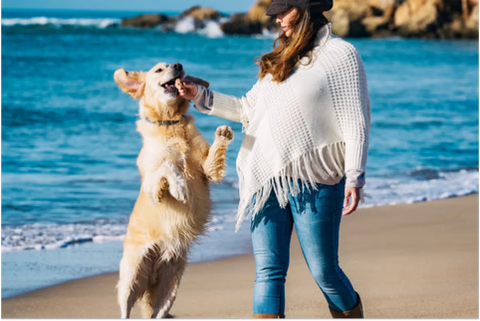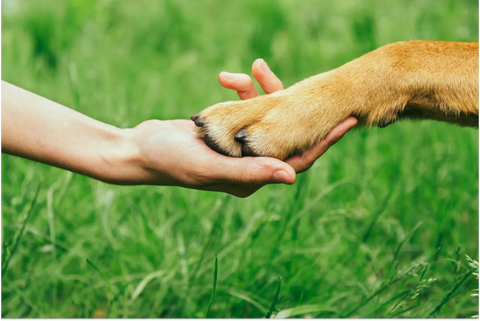
The Best Foods For & How To Feed A Pregnant Dog
Table of Contents
Proper nutrition is fundamental to every living creature's health and well-being; the same goes for our four-legged friends. In fact, dietary needs become even more crucial when a dog is pregnant.
A pregnant dog is not just feeding herself but also her puppies, so her nutrition must be well-managed to promote healthy growth and development for the whole litter. This article aims to guide you through the dietary needs of a pregnant dog, including how to provide for those needs, identify potential issues, and understand when it's time to seek help from the vet.
Let's embark on this journey to ensure the best care for your pregnant canine companion.
Understanding the Pregnancy Cycle of Dogs
Before diving into the details of a pregnant dog's dietary needs, it's essential to understand a dog's pregnancy cycle. A dog's gestation period typically lasts around 63 days or approximately nine weeks and can be divided into three main stages.
The first stage, the embryonic phase, takes up the first three weeks of the pregnancy. This is when the fertilized eggs implant into the uterus, and the embryos begin to form. However, you might not notice many physical changes in your dog during this time.
The second stage, from the fourth week to the sixth week, is characterized by the development of the puppies' major organs and systems. This is when your dog will start showing noticeable physical changes, and her nutritional needs will increase significantly.
The third and final stage, covering the last three weeks of pregnancy, is when the puppies grow rapidly in size, gaining weight and fully developing their physical features. During this time, your dog's food intake should be at its highest to cater to the puppies' rapid growth.
Understanding these stages will help you align the dietary changes with the evolving needs of your pregnant dog. Each stage brings different requirements for nutrients and calorie intake, which we will delve into in the upcoming sections.
What Is a Balanced Diet for a Pregnant Dog?
As your dog progresses through her pregnancy, her body will require higher levels of certain nutrients to support her health and the development of her puppies.
Here is a brief overview of these essential nutrients and the role they play:
- Protein: Protein is a critical nutrient for all dogs, but it's especially crucial for pregnant dogs. It helps in the development of tissues and muscles in the growing puppies. Lean meats such as chicken, turkey, and fish are excellent protein sources.
- Fats: Fats provide the most concentrated source of energy. They're vital for the development of the puppies' nervous systems and for maintaining the mother's health.
- Calcium and Phosphorous: These minerals play a significant role in the development of the puppies' bones and teeth. They must be given in a proper ratio, with calcium being roughly 1.2 times the amount of phosphorus.
- Folic Acid: This B vitamin is crucial for preventing birth defects and promoting healthy growth in puppies.
- Vitamins: Vitamins like A, D, and E contribute to the puppies' immune system development and overall health.
What Should I Feed a Pregnant Dog?
You can choose between store-bought dog food and homemade meals when considering what to feed your pregnant dog. It's crucial to ensure that whichever option you choose meets her increased nutritional needs.
What Should I Buy for My Pregnant Dog?
If you're opting for store-bought dog food, it's important to select high-quality options that cater to the nutritional needs of your pregnant dog. Here are some key factors to consider:
- Life Stage Appropriateness: Choose dog food formulated for "all life stages," or even better, specifically for pregnant or lactating dogs. These products are tailored to provide the necessary nutrients for pregnant dogs and their developing puppies.
- High in Protein: Protein is crucial for your dog and her puppies. Look for dog food with high-quality protein sources (like real meat) listed as the first ingredient.
- Balanced Nutrients: Check the label for balanced levels of fats, carbohydrates, vitamins, and minerals. A well-balanced diet is crucial for your dog's overall health and her puppies' development.
- No Fillers or Artificial Additives: Avoid dog foods with unnecessary fillers (like corn, wheat, or soy), artificial flavors, colors, or preservatives. These ingredients offer no nutritional value and could potentially cause harm.
- Brand Reputation: Research the dog food brand's reputation. Consider if they adhere to the Association of American Feed Control Officials (AAFCO) standards if they've been involved in recalls, and if they conduct feeding trials.
What Should I Cook for My Pregnant Dog?
If you prefer to prepare homemade meals for your pregnant dog, ensure they are nutritionally balanced. Here are some ideas for meals and snacks that you can prepare:
- Protein-Rich Meals: Prepare dishes that include lean meats like chicken, turkey, and beef. Remember to cook all meat thoroughly to eliminate potential pathogens. Fish like salmon is also a good choice, but make sure to remove all bones.
- Vegetables and Grains: Incorporate safe vegetables like carrots, peas, and sweet potatoes, and grains like rice or quinoa into your dog's meals. These provide necessary vitamins and fiber.
- Calcium Sources: Add sources of calcium such as finely ground eggshells or a vet-approved calcium supplement. This is particularly important in the later stages of pregnancy for the puppies' bone development.
- Healthy Snacks: For snacks, consider offering your pregnant dog small pieces of apples, bananas, or cucumbers. Avoid any foods that are toxic to dogs, like onions, garlic, chocolate, and grapes.
- Hydration: Make sure your dog has constant access to fresh water.
Always consult your vet or a certified pet nutritionist before changing your dog's diet, especially when preparing homemade meals, to ensure the meals meet her nutritional needs during pregnancy.
Feeding Schedule for Pregnant Dogs
Maintaining a consistent feeding schedule for a pregnant dog is vital. However, her feeding pattern will likely need to change as her pregnancy progresses.
Early Pregnancy
During the initial stage of pregnancy, you can maintain your dog's regular feeding schedule. In most cases, this will be done twice a day.
Mid Pregnancy
From about the fourth week of pregnancy, gradually increase the amount of food provided. It's often beneficial to split meals into smaller portions but feed more frequently, such as three to four times per day.
Late Pregnancy
Her stomach capacity will decrease in the last few weeks due to the growing puppies, but her energy requirements will be very high. Continue to increase the total amount of food provided and consider feeding her smaller meals more frequently throughout the day.
Post Birth
Once the puppies are born, a mother dog will require even more food to produce milk for nursing. Continue feeding her multiple small meals a day, increasing the total amount as needed based on her condition and vet advice.
Should I Give My Dog Dietary Supplements?
While a balanced diet should provide all the necessary nutrients, there may be situations where your vet recommends dietary supplements.
- Calcium: Supplementing calcium during pregnancy can be risky as it may lead to eclampsia post-birth. Always follow vet advice regarding calcium supplementation.
- Folic Acid: Some vets may recommend a folic acid supplement to support the puppies' development and prevent birth defects.
- Probiotics: Probiotics can benefit a pregnant dog's gut health, potentially reducing the likelihood of digestive issues.
- Prenatal Vitamins: Certain prenatal vitamins formulated for dogs may be suggested by your vet.
It's important to remember that while supplements can be beneficial, they should only be used under the guidance of a vet to avoid over-supplementation and potential harm.
How To Identify Nutritional Deficiencies
Nutritional deficiencies can have serious impacts on your pregnant dog's health and the development of her puppies. Here are some signs that may indicate potential deficiencies:
- Weight Loss or Poor Weight Gain: Even though pregnant dogs should gain weight, too much or too little weight gain can be problematic. Regular vet check-ups can help monitor this.
- Loss of Appetite: If your dog refuses to eat or eats less than usual, this could indicate a deficiency or other health issues.
- Poor Coat Quality: A dog's fur can be a good indicator of her overall health. Her coat may signify a deficiency if it becomes dull, brittle, or thin.
- Lethargy or Depression: Changes in behavior, such as decreased activity level or seeming depressed, could be a sign of nutritional deficiencies.
- Other Physical Symptoms: Issues like persistent vomiting, diarrhea, or other physical changes could indicate deficiencies or health complications.
If you notice any of these signs, it's crucial to consult a vet as soon as possible to address the issue and make necessary dietary adjustments.
When To Visit the Vet
While it's normal for a pregnant dog to experience certain changes, some signs should prompt an immediate visit to the vet. While some dogs might experience mild gastrointestinal discomfort during pregnancy, continuous vomiting or diarrhea is abnormal and requires immediate vet attention.
Some level of fatigue is expected in pregnant dogs, but if your dog becomes excessively tired, unresponsive, or seems depressed, it's time to call the vet. If your dog refuses to eat for an extended period, especially if it's coupled with weight loss, it's a sign that you need to visit the vet.
If your dog experiences difficulty breathing or excessive panting, these symptoms could indicate distress or overheating, both of which require immediate veterinary attention.
Regular vet check-ups throughout the pregnancy are also essential. This will ensure that your dog's pregnancy is progressing healthily and allows for early detection of potential complications.
Keep Your Momma Pup Well Fed
Many dog owners unintentionally make mistakes when feeding their pregnant dogs. This could be due to feeding too much, too little, or feeding the wrong dietary balance.
During this time, your dog’s body is going through immense changes, literally growing multiple lives inside of them, then having to switch, allowing the body to repair itself while producing milk and the needed nutrients for the puppies.
This is why a balanced diet is essential.
Feeding a pregnant dog requires careful attention to her nutritional needs. You can ensure she stays healthy throughout her pregnancy and beyond by providing a balanced diet, monitoring her health, and consulting with your vet regularly. Remember, the goal is the mother's health and the healthy development of her puppies.
For a high protein, nutritious option for your pregnant pup, consider a fresh food diet from A Pup Above. By using quality ingredients and removing the drying process found in normal kibbles, we maintain a nutritious option for dogs that could use the boost.
Sources:
Canine Embryonic Atlas | Cornell University College of Veterinary Medicine
Top Stories

Why Do Dogs Lick Their Paws?

Why Do Dogs Whimper & Make Noises in Their Sleep?

Healthy Vet-Approved Homemade Dog Food Recipes

How To Cook Sweet Potatoes for Dogs






















